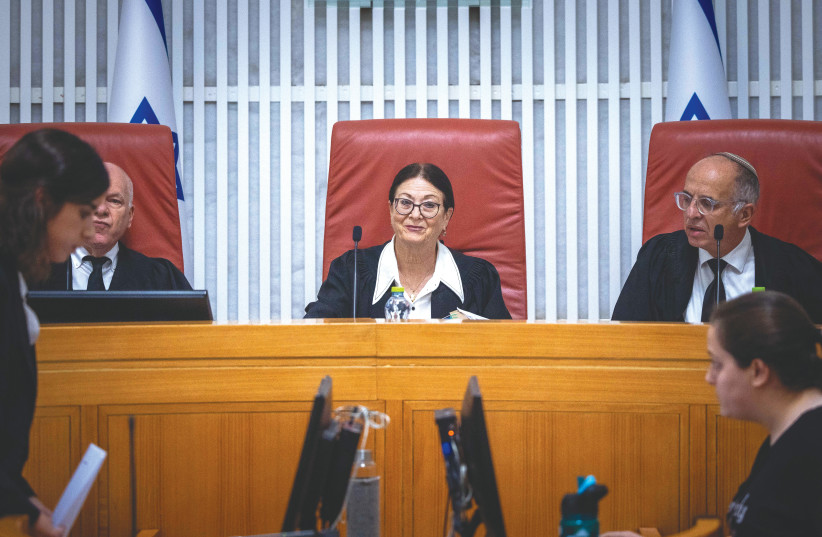The High Court of Justice on Thursday appeared ready to approve the family reunification law as constitutional regarding tightening immigration controls, despite the fact that this makes it harder for Palestinians who marry Israeli Arabs to receive citizenship.
However, at the same time, the justices had significant criticism for aspects of the law, and it was unclear if they would suffice with publicly airing their critiques or seek to cancel distinct portions of the law.
In March and April, multiple NGOs petitioned the High Court to strike down the family reunification law after it was amended.
Adalah and the Association for Civil Rights in Israel told the High Court that even if similar laws have been on the books in Israel for decades, this version of the law was different.
Maintaining democracy
According to Adalah, the latest version of the law is different because it dropped the “pretense” of being said of being about security, saying that part of its purpose in limiting Palestinian-Israeli-Arab marriages was to maintain Israel’s character as a Jewish and democratic state.
The NGO said that taking into account ethnicity as a basis of interfering with marriage and citizenship issues has been rejected since World War II, even by apartheid South Africa in 1980.
Former New Hope MK Zvi Hauser and Religious Zionist MK Simcha Rothman were responsible for adding the clause regarding a Jewish and democratic state, in addition to the standard reference to security considerations.
The Shin Bet (Israel Security Agency) had campaigned hard for the law purely based on security considerations, saying that sometimes Hamas and other groups could use marriage as a way to sneak their agents into Israel as new citizens.
However, the new Jewish and democratic state clause left the High Court in a complex dilemma.
Although Israel’s status as a Jewish and democratic state is strongly enshrined in the Declaration of Independence, the Jewish Nation State Law and other provisions, injecting it specifically into the issue of family reunification causes some legal headaches.
"You are correct, but remember that I was in the minority."
Supreme Court President Esther Hayut
In addition, the number of family reunifications to date has been so low that it can be hard to argue that the volume could have any serious demographic impact.
Coming into the hearing, there was speculation that the justices might find the new clause troubling and strike the entire law, or choose a number of easier ways out of the dilemma.
The justices could say they can ignore the clause because it has no operative or functional impact and is more of a vague philosophical declaration.
Alternatively, they could strike just the clause about the Jewish and democratic state purpose, while preserving the law based on the security considerations’ purpose, which has always been part of the law.
Passing the law itself was the culmination of a nine-month legislative saga when right-wing coalition and opposition parties had a rare moment of joining together in passing the law.
Comments from Supreme Court President Esther Hayut and Justice Uzi Vogelman, with Justice Yitzhak Amit also present, indicated they would not nix the law completely.
They repeatedly challenged the petitioners with the fact that previous petitions to strike the law failed, as recently as 2017.
Balance of power
In a powerful moment of irony, Adalah’s lawyer recalled to Hayut that during a previous petition she had said there was a problem with lumping in groups of people regarding balancing security and their human rights, as opposed to giving a careful individualized analysis to each person and family. Hayut responded, “you are correct, but remember that I was in the minority.”
Still, the justices asked hard questions to the state about whether the security considerations were concrete and updated.
Further, they said that the quota for humanitarian exceptions to the law appeared to be far too low.
It was unclear when the court would issue a decision.
Back in July 2021, a similar bill was defeated by one vote due to a last-minute rebellion by MK Amichai Chikli.
The new law, sponsored by Rothman, applies to Israelis of any nationality who marry any foreign resident. That spouse will not receive citizenship automatically.
The bill was strongly opposed by Meretz and the Arab parties.
Gil Hoffman contributed to this report.


